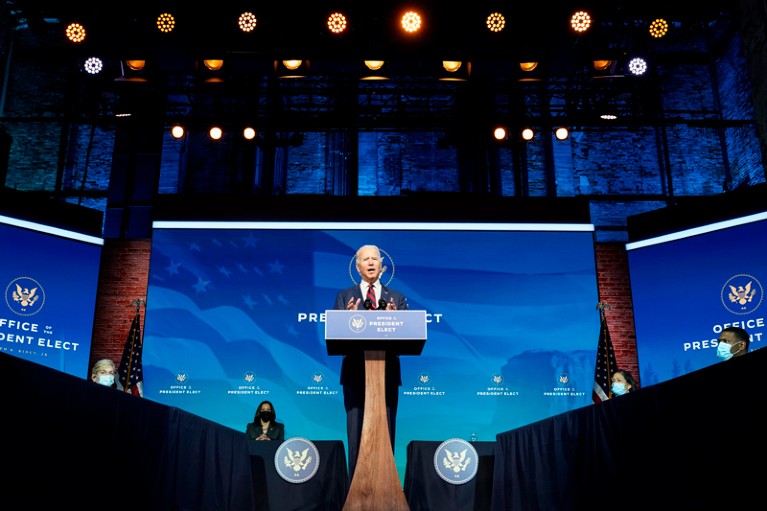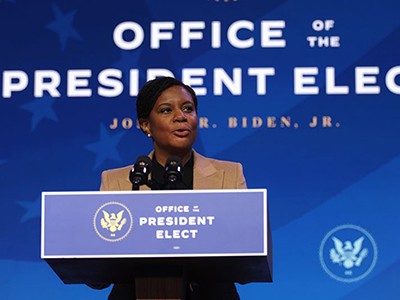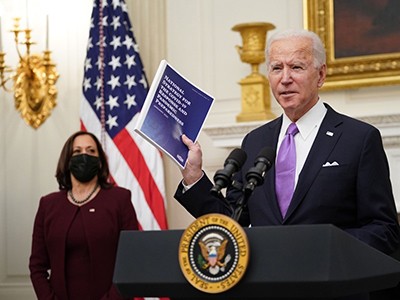
Joe Biden announcing members of his climate and energy team last December.Credit: Joshua Roberts/Getty
As the world faces a pandemic, a climate catastrophe and more, US President Joe Biden is restoring leading scientists, as well as science-policy and science-diplomacy specialists, to positions of responsibility and influence. The world’s scientific community is hugely relieved to see this recommitment to scientific integrity in the US government after four years of neglect, dismissal, denial, suppression and political interference.
Biden’s actions are necessary, but researchers must calibrate their expectations. From the COVID-19 pandemic to climate change, to the survival of democracy, the challenges facing the United States and the world are vast. For Biden and Vice-President Kamala Harris to succeed in the endeavour to integrate evidence-based policies across the entirety of the federal government, the administration’s key players will need to carefully coordinate their efforts. They will also need to work as a unit, and present a united front should members of the Republican party begin any campaigns of misinformation and disinformation.
It’s a relief to see so much expertise back in government. Biden tapped Eric Lander, a mathematician and genomics pioneer, to be his presidential science adviser and director of the Office of Science and Technology Policy (OSTP). This is the highest-ranking scientific position in the US government. It is notable that, for the first time in US history, the head of the OSTP will sit in the cabinet alongside holders of influential ministerial portfolios such as the secretary of state and the treasury secretary.
‘Inspired choice’: Biden appoints sociologist Alondra Nelson to top science post
In another first, Alondra Nelson, a respected scholar of science and technology studies, becomes the OSTP’s inaugural deputy director for science and society. Other strong appointments include infectious-diseases specialist Rochelle Walensky as the head of the Centers for Disease Control and Prevention, and veteran environmental regulator Michael Regan to lead the Environmental Protection Agency (EPA). The top two climate appointments, Gina McCarthy and John Kerry, are equally seasoned hands. McCarthy is a former head of the EPA, and Kerry is a former secretary of state and one of the architects of the 2015 Paris climate agreement. They join the Biden administration in new roles, coordinating US national and international climate policy, respectively. Kerry will also sit in the cabinet.
Joined-up government
The administration has hit the ground running. A revamped coronavirus plan, announced on 21 January, includes the goals of increasing testing, speeding up vaccine roll-out and achieving greater health equity. Last week, Biden also announced an urgent and sweeping review of the scientific-integrity practices of US agencies over the past decade, and ordered agencies to appoint — or reappoint — chief scientific and scientific-integrity officers. The review needs to evaluate, precisely and systematically, how the former administration suppressed data and distorted, politicized and interfered with research findings. The task at hand is not only to restore science to government, but also to work out how to protect it, as much as is possible, from a future administration intent on following the Trump administration’s handbook.
Biden has committed to a raft of measures that put climate at the centre of US domestic and international policy, including freezing oil and gas exploration offshore and on public land, and doubling offshore wind-energy capacity by 2030. He has rejoined the Paris climate accord and announced plans to host a summit of heads of state and government on Earth Day, on 22 April. The climate team will know that the international community has lost valuable years in the effort to address climate change, and that, globally, trust in the US administration is low. The speed with which Biden has acted is impressive, but, as with the broader science agenda, the climate team must work quickly to build in safeguards so that this administration’s achievements cannot be easily erased by a future president.
Biden’s ambitious COVID plan: what scientists think
Biden’s plans also include long-overdue proposals to provide more climate finance to low-income countries, and more-targeted support to underserved communities in the United States. This is in addition to what Biden calls a ‘whole-of-government’ approach to racial equity, and his pledges to address systemic racism in employment, health care, housing and justice.
This agenda, and the review of scientific integrity — and how it has suffered during the past four years — will benefit from Biden’s inspirational appointment of Nelson. Nelson was president of the Social Science Research Council and studies the intersections of race, science, medicine and society. Her most recent book is The Social Life of DNA: Race, Reparations, and Reconciliation after the Genome (2016).
Nelson’s appointment set social media abuzz, because it recognizes the importance of the field of science and technology studies at this juncture. The promise of this discipline lies in its potential to enable the administration to join up its ambitious efforts in scientific, social, racial and environmental justice. If this administration truly seeks to understand how to better protect science in government from political interference, and if it genuinely wants to address systemic racism and historical inequities in funding and health care, then it will need to act on the perspective that Nelson brings, along with that of communities that are too often excluded from science. Biden needs to ensure that these perspectives sit at the centre of his administration’s decisions, not on the periphery.
Putting science, as well as climate, racial and social justice at the heart of national decisions is something that few — if any — of the world’s governments have tried. And, to further complicate matters, many political memoirs and biographies show how ideological differences and competitive behaviour within governments can lead to discord. Incoming administrations include individuals with great ambition for their cause, and some will do whatever it takes to achieve it, even if that means undermining their colleagues in the process.
Members of the Biden–Harris team have just one chance to succeed, and they have a responsibility to their nation and the world. They must not squander this opportunity. Of course, there will be differences of opinion, but these need to be aired constructively to ensure a positive outcome. A willingness to listen and learn will be crucial, and those in the most senior roles, in particular, must lead by example.
The president has raised expectations. He has an extraordinarily ambitious agenda to elevate science, protect some of the most vulnerable groups, bring the pandemic to heel and tackle dangerous climate change. Every one of his senior staff members needs to ensure that they are working towards the administration’s shared goals. Biden has assembled a formidable team. But, on their own, talented individuals won’t be enough to achieve his agenda; they must all pull together if they are to really succeed.

 Biden’s ambitious COVID plan: what scientists think
Biden’s ambitious COVID plan: what scientists think
 ‘Inspired choice’: Biden appoints sociologist Alondra Nelson to top science post
‘Inspired choice’: Biden appoints sociologist Alondra Nelson to top science post
 Joe Biden names top geneticist Eric Lander as science adviser
Joe Biden names top geneticist Eric Lander as science adviser
 The latest on Biden’s science team: biologist named as top adviser
The latest on Biden’s science team: biologist named as top adviser
 Global climate action needs trusted finance data
Global climate action needs trusted finance data





